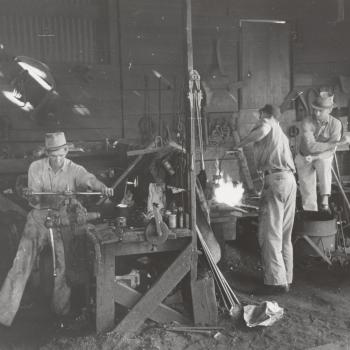Editorials and opinion pieces regularly call upon the bishops or the president or the Congress or business executives to do something: To speak out on racism, to condemn abortion, to restore reverence within family life, to end the virus, to improve the economy, to drain the swamp, to protect liberty, maybe to resign.
Two angels on the Mount of Olivet asked the disciples: People, “why are you standing there looking up?” Likewise, too many in our troubled society are looking up. But not the marvelous young adults who look down at their feet as they step out for racial justice, for a green environment, for dignified work, for respect of each life. Improvement won’t come from on high. This is a moment for organic change.
Allow me to borrow from G.K. Chesterton (1874-1936). Many times we look to so-called great people or to celebrities for solutions. But the Founder of Christianity found virtue by looking inside a thief. Jesus found the honest man on a gibbet. Democracy too finds virtue inside the ordinary. Democracy makes people wise by counting on the weak. Our hope is simply common people at their best. The idea that all people are created equal produces great people. A superior society comes with a high regard for equality—not strict equality of wealth or talent, but the equal dignity that is Creator-given. Inequality destroys democracy. The celebrity often makes other people small, even if those people don’t realize it. The really great person is the ordinary one on the ground who makes each person feel great.
In these days our young adults are pointing the way. In days to come they will acquire necessary public virtues. For example, they must augment their passion with the virtue of longanimity and persevere through the November election, through the next administration, through injustices that surely linger. They must practice the virtue of compromise, realizing that the advance of today is less than perfect justice tomorrow; that protest is not an end but one means toward policy reform. They must become heralds of encouragement, announcing more than denouncing. They must become humble about the ability of technology to yield solutions to situations that are only partially technical. Our society has an enchantment deficit and more technology does not assist a revolution of the heart. Young adults must employ all the virtues they can summon and all the skills they can obtain to create a culture of encounter with no shortcuts in the discipline of face-to-face dialogue.
But for now, all praise to the powerful 2%. They keep moving, even if the destination is not clear. They have a quick step for they sense that their idealism and energy can outpace any devil. A society’s greatness arises from its hospitality to immigrants and to refugees seeking a new life; from its fair and compassionate treatment toward all families of any background or composition, to students and workers, to the elderly and the dispossessed. From an unlikely mixture of society’s characters come poets, taxi drivers, teachers and citizens. Each hamlet, town, neighborhood and metropolis is the incubator of culture and civilization. These are the places where women and men come to make their way in the world. As relationships are nurtured, as people are respected, as injustices are addressed, a true society gives life to the next generation of great people.
Droel edits INITIATIVES (PO Box 291102, Chicago, IL 60629), a newsletter about faith and work.










